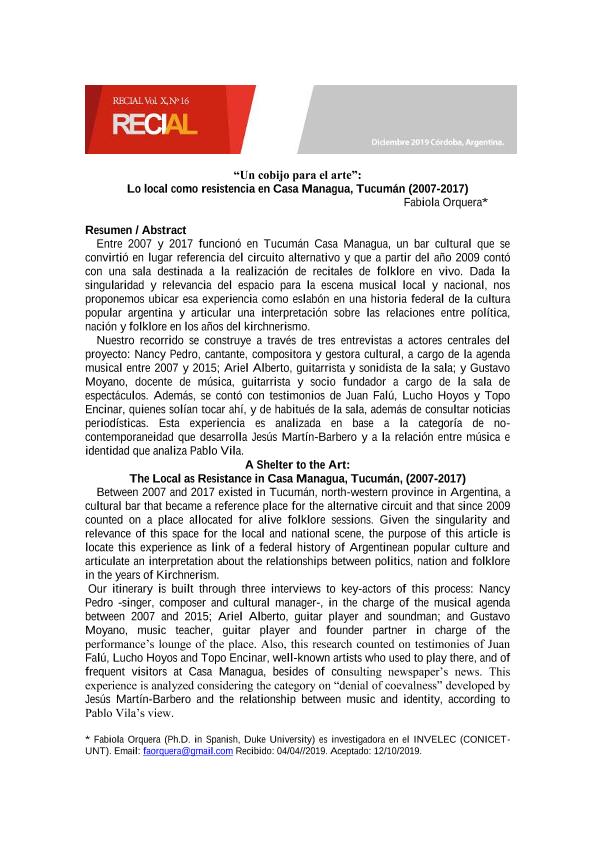Mostrar el registro sencillo del ítem
dc.contributor.author
Orquera, Yolanda Fabiola del Valle

dc.date.available
2022-12-01T13:41:42Z
dc.date.issued
2019-12
dc.identifier.citation
Orquera, Yolanda Fabiola del Valle; “Un cobijo para el arte”: Lo local como resistencia en Casa Managua, Tucumán (2007-2017); Universidad Nacional de Córdoba; Recial; 10; 16; 12-2019; 1-19
dc.identifier.issn
1853-4112
dc.identifier.uri
http://hdl.handle.net/11336/179772
dc.description.abstract
Entre 2007 y 2017 funcionó en Tucumán Casa Managua, un bar cultural que se convirtió en lugar referencia del circuito alternativo y que a partir del año 2009 contó con una sala destinada a la realización de recitales de folklore en vivo. Dada la singularidad y relevancia del espacio para la escena musical local y nacional, nos proponemos ubicar esa experiencia como eslabón en una historia federal de la cultura popular argentina y articular una interpretación sobre las relaciones entre política, nación y folklore en los años del kirchnerismo. Nuestro recorrido se construye a través de tres entrevistas a actores centrales del proyecto: Nancy Pedro, cantante, compositora y gestora cultural, a cargo de la agenda musical entre 2007 y 2015; Ariel Alberto, guitarrista y sonidista de la sala; y Gustavo Moyano, docente de música, guitarrista y socio fundador a cargo de la sala de espectáculos. Además, se contó con testimonios de Juan Falú, Lucho Hoyos y Topo Encinar, quienes solían tocar ahí, y de habitués de la sala, además de consultar noticias periodísticas. Esta experiencia es analizada en base a la categoría de no-contemporaneidad que desarrolla Jesús Martín-Barbero y a la relación entre música e identidad que analiza Pablo Vila.
dc.description.abstract
Between 2007 and 2017 existed in Tucumán, north-western province in Argentina, a cultural bar that became a reference place for the alternative circuit and that since 2009 counted on a place allocated for alive folklore sessions. Given the singularity and relevance of this space for the local and national scene, the purpose of this article is locate this experience as link of a federal history of Argentinean popular culture and articulate an interpretation about the relationships between politics, nation and folklore in the years of Kirchnerism. Our itinerary is built through three interviews to key-actors of this process: Nancy Pedro -singer, composer and cultural manager-, in the charge of the musical agenda between 2007 and 2015; Ariel Alberto, guitar player and soundman; and Gustavo Moyano, music teacher, guitar player and founder partner in charge of the performance’s lounge of the place. Also, this research counted on testimonies of Juan Falú, Lucho Hoyos and Topo Encinar, well-known artists who used to play there, and of frequent visitors at Casa Managua, besides of consulting newspaper’s news. This experience is analyzed considering the category on “denial of coevalness” developed by Jesús Martín-Barbero and the relationship between music and identity, according to Pablo Vila’s view.
dc.format
application/pdf
dc.language.iso
spa
dc.publisher
Universidad Nacional de Córdoba
dc.rights
info:eu-repo/semantics/openAccess
dc.rights.uri
https://creativecommons.org/licenses/by-nc-sa/2.5/ar/
dc.subject
noroeste argentino
dc.subject
Folclore
dc.subject
Identidad
dc.subject
Resistencia cultural
dc.subject.classification
Otras Humanidades

dc.subject.classification
Otras Humanidades

dc.subject.classification
HUMANIDADES

dc.title
“Un cobijo para el arte”: Lo local como resistencia en Casa Managua, Tucumán (2007-2017)
dc.title
A Shelter to the Art: The Local as Resistance in Casa Managua, Tucumán, (2007-2017)
dc.type
info:eu-repo/semantics/article
dc.type
info:ar-repo/semantics/artículo
dc.type
info:eu-repo/semantics/publishedVersion
dc.date.updated
2020-11-18T17:02:57Z
dc.journal.volume
10
dc.journal.number
16
dc.journal.pagination
1-19
dc.journal.pais
Argentina

dc.journal.ciudad
Córdoba
dc.description.fil
Fil: Orquera, Yolanda Fabiola del Valle. Consejo Nacional de Investigaciones Científicas y Técnicas. Centro Científico Tecnológico Conicet - Tucumán. Instituto de Investigaciones sobre el Lenguaje y la Cultura. Universidad Nacional de Tucumán. Facultad de Filosofía y Letras. Cátedra de Literatura Argentina. Instituto de Investigaciones sobre el Lenguaje y la Cultura; Argentina
dc.journal.title
Recial
dc.relation.alternativeid
info:eu-repo/semantics/altIdentifier/url/https://dialnet.unirioja.es/servlet/articulo?codigo=7323560
dc.relation.alternativeid
info:eu-repo/semantics/altIdentifier/url/https://revistas.unc.edu.ar/index.php/recial/article/view/27019
dc.relation.alternativeid
info:eu-repo/semantics/altIdentifier/doi/http://dx.doi.org/10.53971/2718.658x.v10.n16.27019
Archivos asociados
